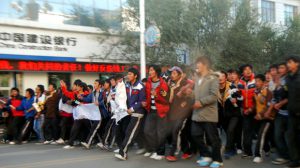
On October 19 Qinghai province witnessed a major protest against the Chinese government decision to replace Tibetan with Chinese language as a medium of instruction in Tibetan schools. Around 1500 students from six schools, and monks of Rongpo monastery gathered at Rebkong in Malho Tibetan Autonomous Prefecture (TAP) to express their opposition.
Around 30 police vehicles surrounded the protestors but no arrests were made. Later, Ah Gendun, the Deputy Head of the Malho TAP and Seru Gyaltsen, head of the Malho Education Department appealed for calm and assured the protestors that the matter would be taken up at the highest level in the province.
At Vancouver in far away United States, local Tibetans and their supporters held a protest demonstration on Oct 16 against eh acquisition of the Gyama mine in Lahasa by the Vancouver-based China Gold International Resources. The protestors held banners and Tibetan national flags and shouted slogans against exploitation of Tibet’s natural mineral resources.
Located in the Meldrogongkar County in Lhasa, Gyama mining project is one of the eight priority construction projects of China to tap Tibet’s natural resources. It is a two-year old programme that has run into rough weather locally also. In June 2009 itself, the area was rocked by protests against mining activity. Petitions were also sent to the local government crying a halt to the project.
Tagyal, a Tibetan writer and intellectual, was jailed in April 2010 on charges of ‘instigating to split the motherland’. He was released recently (Oct 14) on bail pending trial. Talking to Voice of Tibet radio service over phone, Beijing-based Tibetan writer and blogger, Tsering Woser said that she had heard about the release from Tagyal’s lawyer Li Fanping. But, she did not know the exact reasons for his release but believed that the popularity of Tagyal’s case in the international media might have been one of the factors.
Tibetans have recently protested against the mining activities in Lhemar village in Driru country of Naqu Prefecture in Tibet Autonomous Region (TAR). Due to the continuous protests, the administration has temporarily stopped mining activities.
The US Congressional-Executive Commission on China in its 2010 report (released on October 16) asked the Chinese government to hold substantive dialogue with the Dalai Lama or his representatives on protecting Tibetan culture, language, religion and heritage in Tibet. It said that such a move could result in a durable and mutually beneficial outcome for Chinese and Tibetans, and improve the outlook for local and regional security in coming decades.
The report told the Chinese government to refrain from infringing upon Tibetan Buddhists’ right to freedom of religion. ‘Don’t use security establishments and courts in repressing Tibetans’ right to freedom of speech, religion and association’. It denounced aggressive campaigns of ‘patriotic education’ in Tibet. It also disapproved of development plans outlined in the 5th Work Forum on Tibet saying these plans have subordinated Tibetan culture to the Communist Party and the Chinese Government priorities.
The US body called upon the Chinese government to invite a representative of an international organization to meet Gedhun Choekyi Nyima, the Dalai Lama recognized 11th Panchen Lama. It urged the US administration to raise the cases of Tibetans who were imprisoned as punishment for peaceful exercise of human rights during meetings and correspondence with Chinese officials.
Ulan Bator (Mongolia) hosted a 2-day international symposium on ‘1913 Treaty between Mongolia and Tibet’ in October (13 and 14). Thirty-seven delegates from Mongolia, the US, Korea, Canada, Russia, Taiwan, Japan, the Netherlands and Germany attended the event organised by ‘The Independence’, a journal published by Magnolia’s National Intelligence Academy.
Most speakers said the ‘1913 Treaty’ had a factual basis and was official. Since a treaty can be between two independent entities, their conclusion was: the treaty implied that Mongolia had entered into a Treaty with an independent state, Tibet.
The Government of Mongolia, however, refused to be associated with the symposium and declared that it would not like to take any position on the Treaty per se.

Be First to Comment